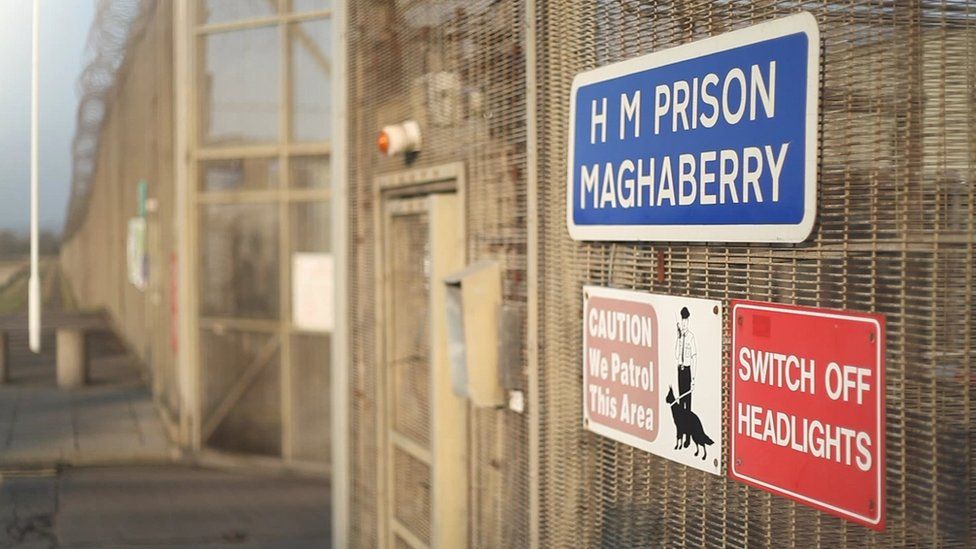Northern Ireland prisons: 'Solitary confinement' breaking UN standards
- Published

Some Northern Ireland prisoners are being held in what amounts to "solitary confinement" in breach of international standards, a report has found.
CCTV recordings over a five-day period showed 20 inmates at Maghaberry Prison near Lisburn did not leave their cells.
The report by Criminal Justice Inspection (CJI) raised "significant concerns about the treatment of prisoners".
The Prison Service said parts of the report make for difficult reading.
The report was commissioned by Justice Minister Naomi Long and looked at care and supervision units (CSUs) within Northern Ireland's three prison sites at Maghaberry, Hydebank Wood and Magilligan.
Mrs Long told the Northern Ireland Assembly the report had been a "difficult read for me and the prison service"
She said: "It's regrettable and disturbing that some of the small number of prisoners in our CSUs experience such isolation."
She said those in CSUs represented about 1% of the prisoner population.
She added: "I do not believe such an in-depth review has been carried out anywhere across these islands."
Among prisoners, the units are known as "the block".
They normally hold about 2% of Northern Ireland's jail population at a given time.
The units are used to segregate prisoners who, for example, break rules or pose a risk to their own safety or the safety of others.
Some have severe mental health disorders and, the report said, it was "questionable if prison is the most appropriate place for them".
What is solitary confinement?
However, accepted standards of treatment are expected to apply, including those endorsed by the United Nations and known as the Mandela Rules.
The rules are meant to ensure prisoners have access to healthcare and "purposeful activity" such as exercise.
They also define solitary confinement as a period of 22 hours or more a day without meaningful human contact.
The CJI's Jacqui Durkin said: "The review found evidence that the regime experienced by a number of prisoners did not meet the UN standards.
"We found evidence that prisoners were spending too long in their cell without meaningful human contact."
CJI examined records covering many years and made inspection visits at the start of 2021, when CCTV footage was also reviewed.
At Maghaberry, CCTV showed prisoners in the care and supervision unit spent, on average, 25 minutes a day outside their cells - and 20 of 42 inmates did not leave their cells at all.
Average time outside cells at Magilligan and Hydebank Wood were 26 and 89 minutes respectively.
The report stated: "Inspectors concluded that a number of prisoners in care and supervision units had experienced conditions amounting to solitary confinement."
Inspectors also found the shared unit for young men and women at Hydebank Wood, in place at the time visits were undertaken, was "out of step", as it did not provide entirely separate facilities for women.
Overall, the report made 11 operational recommendations for improvement.
'No one is held in degradation'
The director general of the Prison Service, Ronnie Armour, accepted the need for improvement.
"Parts of this report are difficult to read," he said.
"While I accept the finding, I need to stipulate very clearly that no one is held within any of our prisons in severe degradation or isolation as the term solitary confinement suggests.
"Every cell door is opened every day, on several occasions, and no-one goes without contact with staff or prison healthcare teams.
"But we can do better and we will do better."
The chair of the body that represents prison governors said he was "incredulous" that the report's authors believe the coronavirus pandemic had no bearing on things.
Gary Alcock, chairman of the Prison Governors Association (Northern Ireland), added: "The people held in care and supervision units are placed there because of their evidenced violence or proven danger to themselves or others.
"The decision to place someone there is not taken lightly and there is not a prison across the UK which does not operate a very similar system."
He added there would be a "positive response" to the recommendations and their implementation.
Related Topics
- Published8 October 2021
- Published15 October 2021
- Published29 March 2021